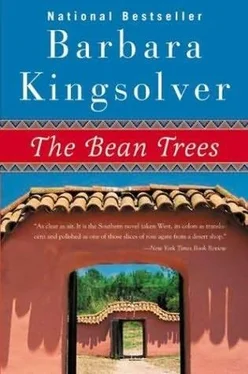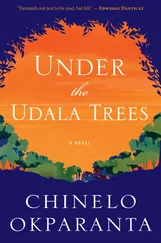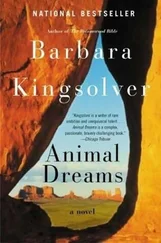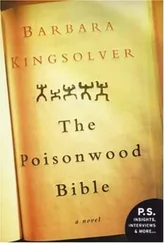Then out of the clear blue sky he said, “In Guatemala City the police use electricity for interrogation. They have something called the ‘telephone,’ which is an actual telephone of the type they use in the field. It has its own generator, operated by a handle.” He held up one hand and turned the other one in a circle in front of the palm.
“A crank? Like the old-fashioned telephones?”
“Operated with a crank,” he said. “The telephones are made in the United States.”
“What do you mean, they use them for interrogation? Do you mean they question you over the telephone?”
Estevan seemed annoyed with me. “They disconnect the receiver wire and tape the two ends to your body. To sensitive parts.” He just stared at me until it hit me like a truck. I felt it in my stomach muscles, just the way I did when I realized that for nearly an hour I had been in the presence of Newt Hardbine’s corpse. There is this horrible thing staring you in the face and you’re blabbering about bowling-pin lamps and 4-H.
“I’ll get us another beer,” I said. I went to the kitchen and brought back the rest of the six pack, carrying it by the plastic rings like a purse. I popped two of them open and plumped back down on the sofa, no longer caring what I looked like. The schoolgirl nerves that had possessed me half an hour ago seemed ridiculous now; this was like having a crush on some guy only to find out he’s been dating your mother or your math teacher. This man was way beyond me.
“I don’t know exactly how to say this,” I said. “I thought I’d had a pretty hard life. But I keep finding out that life can be hard in ways I never knew about.”
“I can see that it would be easier not to know,” he said.
“That’s not fair, you don’t see at all. You think you’re the foreigner here, and I’m the American, and I just look the other way while the President or somebody sends down this and that, shiploads of telephones to torture people with. But nobody asked my permission, okay? Sometimes I feel like I’m a foreigner too. I come from a place that’s so different from here you would think you’d stepped right off the map into some other country where they use dirt for decoration and the national pastime is having babies. People don’t look the same, talk the same, nothing. Half the time I have no idea what’s going on around me here.”
A little shadow moved in the doorway and we both jumped. It was Turtle.
“You’re a rascal,” I said. “You hop back to bed this minute.”
She took one hop backwards, and both Estevan and I tried not to smile. “This minute,” I said, in the meanest voice I could muster. She hopped backwards through the door, clapping her hands one time with each hop. We could hear her hopping and clapping all the way back through the kitchen and into bed. Snowboots jumped onto the back of the sofa and sat behind my neck, waiting for something. He made me nervous.
“All I am saying is, don’t be so sure until you have all the facts,” Estevan said. “You cannot know what Esperanza has had to live through.”
I was confused. He was picking up the middle of a conversation I didn’t even know we’d started.
“No,” I said. “I don’t. Or you either.”
He looked away from me and touched the corners of his eyes, and I knew he was crying in the secret way men feel they have to do. He said something I couldn’t hear very well, and a name, “Ismene.”
I shoved Snowboots gently away from the back of my neck. “What?” I asked.
“Do you remember the day we walked in the desert? And you asked why Esperanza was staring at Turtle, and I told you she looked very much like a child we knew in Guatemala.” I nodded. “The child was Ismene.”
I was afraid to understand this. I asked him if he meant that Ismene was their daughter, and Estevan said yes, that she was. She was taken in a raid on their neighborhood in which Esperanza’s brother and two friends were killed. They were members of Estevan’s teachers’ union. He told me in what condition they had found the bodies. He wasn’t crying as he told me this, and I wasn’t either. It’s hard to explain, but a certain kind of horror is beyond tears. Tears would be like worrying about watermarks on the furniture when the house is burning down.
Ismene wasn’t killed; she was taken.
Try as I would, I couldn’t understand this. I was no longer so stupid as to ask why they didn’t call the police, but still I couldn’t see why they hadn’t at least tried to get her back if they knew the police had taken her, and where. “Don’t be upset with me,” I said. “I know I’m ignorant, I’m sorry. Just explain it to me.”
But he wasn’t upset. He seemed to get steadier and more patient when he explained things, as if he were teaching a class. “Esperanza and I knew the names of twenty other union members,” he said. “The teachers’ union did not have open meetings. We worked in cells, and communicated by message. Most people knew only four other members by name. This is what I am saying: In Guatemala, you are careful. If you want to change something you can find yourself dead. This was not the-what do you call? The P.T.A.”
“I understand.”
“Three members had just been killed, including Esperanza’s brother, but seventeen were still alive.
She and I knew every one of those seventeen, by name. Can you understand that this made us more useful alive than dead? For us to go after Ismene is what they wanted.”
“So they didn’t kill her, they just held her? Like… I don’t know what. A worm on a goddamn hook?”
“A goddamn hook.” He was looking away from me again. “Sometimes, after a while, usually… these children are adopted. By military or government couples who cannot have children.”
I felt numb, as if I had taken some drug. “And you picked the lives of those seventeen people over getting your daughter back?” I said. “Or at least a chance at getting her back?”
“What would you do, Taylor?”
“I don’t know. I hate to say it, but I really don’t know. I can’t even begin to think about a world where people have to make choices like that.”
“You live in that world,” he said quietly, and I knew this, but I didn’t want to. I started to cry then, just tears streaming out all over and no stopping them. Estevan put his arm around me and I sobbed against his shoulder. The dam had really broken.
I was embarrassed. “I’m going to get snot on your clean shirt,” I said.
“I don’t know what it is, snot.”
“Good,” I said.
There was no way on earth I could explain what I felt, that my whole life had been running along on dumb luck and I hadn’t even noticed.
“For me, even bad luck brings good things,” I told him finally. “I threw out a rocker arm on my car and I got Turtle. I drove over broken glass on an off ramp and found Mattie.” I crossed my arms tightly over my stomach, trying to stop myself from gulping air. “Do you know, I spent the first half of my life avoiding motherhood and tires, and now I’m counting them as blessings?”
Turtle showed up in the doorway again. I don’t know how long she had been there, but she was looking at me with eyes I hadn’t seen on her since that night on the Oklahoma plain.
“Come here, pumpkin,” I said. “I’m okay, just sprung a leak, don’t you worry. Do you want a drink of water?” She shook her head. “Just want to cuddle a few minutes?” She nodded, and I took her on my lap. Snowboots jumped onto the sofa again. I could feel the weight of him moving slowly across the back and down the other arm, and from there he curled into Estevan’s lap. In less than a minute Turtle was asleep in my arms.
When I was a child I had a set of paper dolls. They were called the Family of Dolls, and each one had a name written on the cardboard base under the feet. Their names were Mom, Dad, Sis, and Junior. I played with those dolls in a desperate, loving way until their paper arms and heads disintegrated. I loved them in spite of the fact that their tight-knit little circle was as far beyond my reach as the football players’ and cheerleaders’ circle would be in later years.
Читать дальше












